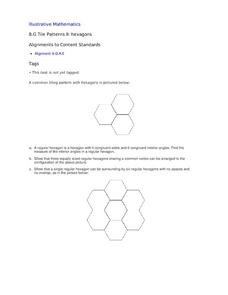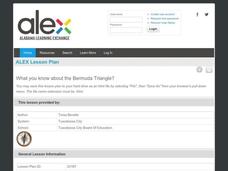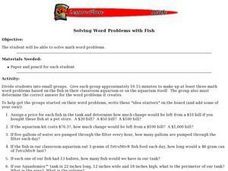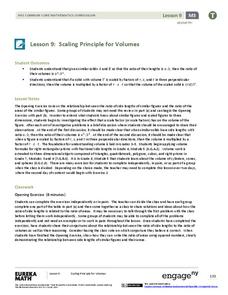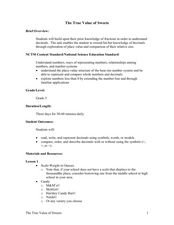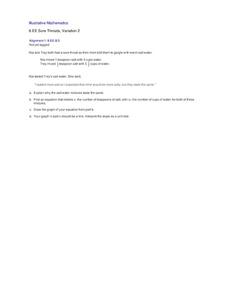Baylor College
Do Plants Need Light?
Turn your classroom into a greenhouse with a lesson plan on plant growth. First, investigate the different parts of seeds, identifying the seed coat, cotyledon, and embryo. Then plant the seeds and watch them grow! Measure the new plants...
Curated OER
Tile Patterns II: Hexagons
After learning that the sum of interior angles for triangles is 108 degrees, take it further to show that the sum of angles in any polygon is the same! Using hexagons, pupils practice finding the measure of the six congruent angles. Make...
Cord Online
Pyramids and Cones
Young mathematicians find the surface area and volume of a square pyramid and a cone. In what looks like a typical activity out of a textbook, you'll find an activity where learners find an unknown measurement of a pyramid or cone,...
EngageNY
Solve for Unknown Angles—Transversals
Lead your class on an exciting journey through the world of math as they review geometry facts and solve for unknown angles. They learn how to use auxiliary lines and congruent angles to correctly complete each practice problem...
Mathematics Assessment Project
Estimating Length Using Scientific Notation
Would you rather have a million dollars or 1 x 10^6 dollars? To find the answer to this question, class members first complete an assessment task converting numbers between decimal notation and scientific notation. They then take part in...
Alabama Learning Exchange
What You Know About the Bermuda Triangle?
Get lost in the classifications. Using the backdrop of the Bermuda Triangle, pupils classify it by angle and side measures. They also learn information about the triangle and its history.
Curated OER
Solving Word Problems with Fish
Send your class fishing...for the right answers! Small groups collaborate to create math word problems based on the fish in their classroom aquarium or on the aquarium itself. After all groups determine the answer for their ownproblem,...
Curated OER
Similarity and Dilations - Discover Properties of Similar Figures
Learners investigate properties of similar figures. For this properties of similar figures lesson, pupils construct similar figures using Cabri Jr. They dilate their figure to create a similar one, and discuss the relationships between...
Curated OER
M & M Madness
M&M's are always a great manipulative to use when teaching math. In this graphing lesson plan, learners predict how many of each color of M & M's there are. They count up each color and plug the data into a graph using the...
Curated OER
"Polly"gon Pockets
Explore polygons with your elementary learners. Divide the class in 12 to configure the polygon puzzle before them. They list the attributes of each type of polygon they see, and if there's time, they jump on the interactive website...
Curated OER
Principles of Square Roots Lesson Plan
Middle and high schoolers investigate all the different places in math that square root is present. In this geometry lesson, pupils discuss square roots as it relates to a right triangle and construction. They go over altitude, rise,...
EngageNY
More on Modeling Relationships with a Line
How do you create a residual plot? Work as a class and in small groups through the activity in order to learn how to build a residual plot. The activity builds upon previous learning on calculating residuals and serves as a precursor to...
EngageNY
Scaling Principle for Volumes
Review the principles of scaling areas and draws a comparison to scaling volumes with a third dimensional measurement. The exercises continue with what happens to the volume if the dimensions are not multiplied by the same constant.
EngageNY
Using Matrix Operations for Encryption
Data encryption is an important security measure for sensitive data stored on computers. Pupils learn how to utilize matrices for creating code. They also get a great review of matrix multiplication, inverse matrices, and the identity...
Virginia Department of Education
Logarithmic Modeling
Explore logarithms and logarithmic regression. Young mathematicians first learn about inverse functions and about the logarithm function family. They take their newfound knowledge to use logarithmic functions to model situations and...
Virginia Department of Education
Curve of Best Fit
Which function models the data best? Pupils work through several activities to model data with a variety of functions. Individuals begin by reviewing the shapes of the functions and finding functions that will fit plotted data points. By...
Curated OER
Multiplication and Areas
Upper graders solve problems involving measurement of squares and rectangles to practice multiplication skills, finding area, and calculating prices and percentages. A performance assessment is included.
Curated OER
What's the Frequency, Roy G. Biv?
Introduce starting space scientists to the electromagnetic spectrum, expecially the portion of visible light. Teach them about wavelength and frequesncy. Then give them a roll of adding machine tape and a manila folder to make a...
Curated OER
Volume
In this math worksheet, students give the volume of 5 shapes in cubic centimetres. Each shape has the cubic centimetres clearly marked.
Curated OER
Cold, Clouds, and Snowflakes
Students explore satellite data and graphing. In this weather data analysis math and science lesson, students analyze NASA satellite data to draw conclusions about geographical areas where precipitation might have happened. Students...
Curated OER
Let's Plot Points
Use coordinate grid paper to plot points and identify shapes that are already plotted on the paper by saying their coordinates. Pupils also measure the distance between points and play the game Battleship. There are several web links and...
Curated OER
The True Value of Sweets
Measure your pupil's learning in a lesson designed to explore decimals by weighing different candies on a scale and recording the weight. Small groups then compare and order the decimal weights on a number line to show their...
Hawaiʻi State Department of Education
Angles on Kandinsky
Not only is Wassily Kandinsky fun to say, his art contains tons of angles. Learners discuss Kandinsky's music-inspired abstract art and four types of angles. They search one of his paintings for obtuse, right, straight, and acute angles,...
Illustrative Mathematics
Sore Throats, Variation 2
What does math have to do with a sore throat? When you mix water and salt you have a great review of how to represent proportional relationships by an equation or graph. Here the proportions of the mixtures may be different, but the...
Other popular searches
- Perimeter Math Measurement
- Math Measurement Inches
- Math Measurement Lesson Plans
- Math Measurement Length
- Math Measurement Metric
- Esl Math Measurement
- Math Measurement Worksheets
- Esol Math Measurement
- Math Measurement Lessons
- Liquid Measurement in Math
- Measurement/math Literature
- Angle Measure Math



